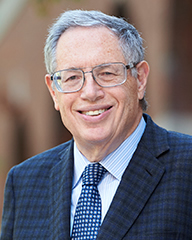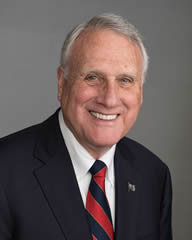111 E Taylor St
Phoenix, AZ 85004

The Resurgence of Economic Liberty
March 15 — 16, 2019On March 15-16, 2019, the Federalist Society's student chapter at the ASU Sandra Day O'Connor College of Law hosted the 38th National Student Symposium in Phoenix, AZ. The theme for the Symposium was “The Resurgence of Economic Liberty.” Audio and video is now available on the agenda tabs.
Fees • Travel Scholarship • Lodging
Arizona has long been at the forefront of promoting economic liberty and free market ideals, and this year’s symposium reflects this commitment by focusing on "The Resurgence of Economic Liberty." The theme is inspired by Frédéric Bastiat’s maxim: “Life, liberty, and property do not exist because men have made laws. On the contrary, it was the fact that life, liberty, and property existed beforehand that caused men to make laws in the first place.”
The story of the American founding is inextricably linked with a quest for economic liberty. From restrictions on trade to heavy taxes, tyranny in the economic sphere is one of the most commonly cited abuses of governmental power that sparked the American Revolution. Economic theories played a central role in the debates leading to the Constitution’s ratification. In discussing factions, relations among the states, congressional powers, and other fundamental constitutional themes, the Founders recognized the critical ways in which the ideas of liberty, justice, and equality could only be realized through an understanding of markets and related economic interests.
Indeed, the “American Dream” itself can be characterized in terms of economic self-determination, including the right to choose a profession, earn a livelihood, and buy and sell on the same terms as fellow citizens. The twentieth century witnessed a vast expansion of governmental power and the administrative state, which some scholars have argued has distorted the Framers’ original constitutional design—all with a profound impact on economic liberty and welfare, and thus the way of life for millions of Americans.
Today, Americans remain deeply divided over the meaning and importance of economic liberty, and, as a result, the topic often animates social discourse and decision-making at all levels of government. The question of how much the government ought to intrude into the economic realm is a fundamental fault line that divides not only American conservatives and liberals, but also conservatives and libertarians, as well as adherents to various schools of thought within each of those political philosophies. As a matter of constitutional interpretation, even staunch originalists disagree with one another over the extent to which the nation’s charter protects economic liberty.
The Symposium’s panels will focus on the legal and philosophical roots of economic liberty and explore how those roots should inform jurisprudence and political thought in addressing contemporary issues. The panels will delve deeply into first principles underlying our constitutional scheme as well as explore their application to cutting-edge technologies, regulatory schemes, and business models. We will challenge attendees to deepen their understanding of the relationship between economic liberty and legal rights, and to test personal economic beliefs against commitments to originalism and the rule of law.
Friday Evening Keynote:
Is Lochner v. New York Constitutionally Indefensible?

Prof. Richard Epstein
Laurence A. Tisch Professor of Law and
Director, Classical Liberal Institute,
New York University School of Law
Saturday Evening Banquet "Fireside Chat" Keynote:
We're thrilled to announce that Arizona Governor Doug Ducey will be our Keynote speaker at the Saturday evening banquet. Governor Ducey was the CEO of Cold Stone Creamery before becoming Arizona's 32nd State Treasurer. In 2014 he was elected the 23rd Governor of Arizona.
This will be a "fireside chat" moderated by Senator Jon Kyl (AZ), former member of the U.S. House of Representatives (AZ) (1987-1995), Senate Minority Whip (2007-2013), Chairman of the Republican Policy Committee (2003-2007) and Republican Conference (2007).

Moderator: Sen. Jon Kyl (AZ)
Photo credit: U.S. Senate Photographic Studio
Student Symposium Registration ONLY (includes all events except the Saturday night cocktail reception and banquet.):
Banquet and Saturday night cocktail reception (This does not include Student Symposium registration. You must also register for the Student Symposium Registration as well if you’d like to attend the panels/lunch.):
Banquet registration is now closed. If you are still interested in attending the banquet, a few tickets may be available at on-site registration.
50% TRAVEL SCHOLARSHIP (TRAVEL ONLY—does not include lodging) FOR DUES-PAYING STUDENT MEMBERS: https://fedsoc.org/travelscholarship
JOIN OR RENEW YOUR STUDENT MEMBERSHIP ($5): https://fedsoc.org/join
Rather than reserve a block of rooms at a predetermined hotel, ASU Law has embraced the symposium theme of economic liberty and provided Symposium attendees with a link through which you can access all ASU-wide hotel special hotel rates in the Phoenix area. This optimizes consumer choice, and hopefully will lead to more efficient outcomes. That said, Phoenix hotels book very quickly during March with great weather and lots of Baseball Spring Training going on in the area. Make sure to book your hotel rooms early!
ASU Law discount lodging link:
https://visit.asu.edu/travel
The hotel where most non-panel events will be held is the Sheraton Grand Phoenix Hotel, located directly across the street from ASU Law at: 340 N 3rd St., Phoenix, AZ 85004.
Back to top2019 National Student Symposium
2019 National Student Symposium
| Topics: | Constitution • Law & Economics • Supreme Court |
|---|
On March 15-16, 2019, the Federalist Society's student chapter at the ASU Sandra Day O'Connor College of Law hosted the 2019 National Student Symposium. The symposium opened with a keynote lecture by Prof. Richard Epstein on "Is Lochner v. New York Constitutionally Indefensible?"
KEYNOTE TOPIC: Is Lochner v. New York Constitutionally Indefensible?
Is Lochner v New York constitutionally indefensible? It is commonly asserted that there are only four cases in American constitutional history that are beyond the pale: Dred Scott v. Sanford, Plessy v. Ferguson, Korematsu v United States, and Lochner v. New York. The stark contrast between decisions that have thwarted economic and social liberties and the one case that defends it, should itself be sufficient to explain why economic liberties today deserve increased constitutional protection. In this lecture, Professor Epstein will examine the yawning gulf between Lochner and these three other decisions.
Featuring:
As always, the Federalist Society takes no position on particular legal or public policy issues; all expressions of opinion are those of the speaker.
2019 National Student Symposium
| Topics: | Fourteenth Amendment • Constitution • Law & Economics • Supreme Court |
|---|
On March 15-16, 2019, the Federalist Society's student chapter at the ASU Sandra Day O'Connor College of Law hosted the 2019 National Student Symposium. The first panel discussed "The Original Understanding of 'Privileges of Immunities'".
Scholars contest the original meaning of the Fourteenth Amendment. In 1873, the Supreme Court rejected a challenge to state economic regulations under the Privileges or Immunities Clause of the Fourteenth Amendment in the Slaughter-House Cases. Since then, the Privileges or Immunities Clause has been best known as a “practical nullity.” However, Justice Thomas provided a strong challenge to this interpretation in his McDonald v. City of Chicago concurrence.
This panel explores whether the Fourteenth Amendment was principally concerned with equality, guaranteeing fundamental rights, or both. If the Fourteenth Amendment does guarantee fundamental rights, does it merely incorporate the bill of rights against the states, or does it do more and provide protections for economic liberty? And was the Amendment intended to accomplish these purposes through a substantive notion of “due process” or through the Privileges or Immunities Clause? Is the fundamental-rights view inconsistent with judicial restraint? This panel will discuss these fundamental questions concerning the Fourteenth Amendment’s original meaning, and whether maintaining an expansive notion of substantive due process or resurrecting the Privileges or Immunities Clause would be an ill-conceived invitation to judicial activism.
As always, the Federalist Society takes no position on particular legal or public policy issues; all expressions of opinion are those of the speakers.
2019 National Student Symposium
| Topics: | Article I Initiative • Federalist Society |
|---|
On March 15-16, 2019, the Federalist Society's student chapter at the ASU Sandra Day O'Connor College of Law hosted the 2019 National Student Symposium. The winner of the second Annual Article I Initiative Writing Contest was Deion Kathawa, a student at Notre Dame Law School.
The Federalist Society's Article I Initiative is focused on the critical issue of why the modern Congress is not functioning as the most powerful branch as envisioned by the Framers. In order to help engage new thought and discussion, the Initiative's second annual writing contest dealt with the theme "Ambition Counteracting Ambition: Enduring Principle or Failed Experiment?"
Featuring:
As always, the Federalist Society takes no position on particular legal or public policy issues; all expressions of opinion are those of the speakers.
2019 National Student Symposium
| Topics: | Administrative Law & Regulation • Federalist Society • Regulatory Transparency Project |
|---|
Nate Kaczmarek, Director of the Federalist Society's Regulatory Transparency Project, will introduce filmmakers Patrick Reasonover and Jo Jenson from Just Add Firewater to talk about RTP's forthcoming full length, documentary film "They Say It Can't Be Done" and provide a preview screening for the conference. Afterward the filmmakers will be available to speak with students about the film at the reception.
2019 National Student Symposium
2019 National Student Symposium
2019 National Student Symposium
2019 National Student Symposium
| Topics: | Law & Economics |
|---|
On March 15-16, 2019, the Federalist Society's student chapter at the ASU Sandra Day O'Connor College of Law hosted the 2019 National Student Symposium. The second panel asked "Is Economic Protectionism a Legitimate State Interest?".
The Tenth Circuit held in Powers v. Harris that “intra-state economic protectionism, absent a violation of a specific federal statutory or constitutional provision, is a legitimate state interest.” The Second Circuit agrees. In contrast, the Fifth and Sixth Circuits have struck down laws aimed at protecting local economic actors as unjustified by state police power. Does a state violate the Equal Protection Clause when it restricts economic liberty for the sole purpose of economic protectionism? For example, is the Equal Protection Clause violated when a state doesn’t make an activity or ownership of a certain type of property per se illegal, but the state employs economic “checkpoints” to significantly discourage the activity or specified property ownership (i.e., guns, pornography, etc.).
This panel will also explore the impact of cronyism on emerging technologies and federalism. For example, had Uber and Lyft not been so successful in expeditiously building themselves up before being taken seriously by regulators and traditional industry competitors (i.e., taxi companies), the taxi companies likely could have, and would have, lobbied to pass legislation and create regulations making ridesharing companies like Uber and Lyft illegal, or so cost prohibitive as to preclude the ridesharing industry from ever being financially viable.
As always, the Federalist Society takes no position on particular legal or public policy issues; all expressions of opinion are those of the speakers.
2019 National Student Symposium
| Topics: | Criminal Law & Procedure • Law & Economics |
|---|
On March 15-16, 2019, the Federalist Society's student chapter at the ASU Sandra Day O'Connor College of Law hosted the 2019 National Student Symposium. The third panel explored "Economic Liberty in Criminal Justice: Business Crimes and Economic Sanctions".
Although criminal justice is often associated with non-economic issues—such as those raised by violent crimes and long prison sentences—the system regularly implicates individual economic liberty, as can be seen in the prohibition and prosecution of certain commercial and financial interactions. Sometimes individuals are held strictly liable for their actions even in the absence of force, fraud, or direct harm. In turn, the government may impose a variety of economic sanctions for purported wrongdoing, with fines, fees, and forfeitures levied in legal processes which often seem bereft of basic procedural protections. This panel will explore these and other criminal justice issues and the implications for individual economic liberty.
As always, the Federalist Society takes no position on particular legal or public policy issues; all expressions of opinion are those of the speakers.
2019 National Student Symposium
| Topics: | Federalist Society |
|---|
Box lunches will be available for pick up in the Snell & Wilmer Plaza.
Panelists:
2019 National Student Symposium
| Topics: | Federalist Society |
|---|
Box lunches will be available for pick up in the Snell & Wilmer Plaza.
Panelists:
2019 National Student Symposium
Box lunches will be available for pick up in the Snell & Wilmer Plaza.
Breakout Sessions:
2019 National Student Symposium
| Topics: | Financial Services • Law & Economics |
|---|
On March 15-16, 2019, the Federalist Society's student chapter at the ASU Sandra Day O'Connor College of Law hosted the 2019 National Student Symposium. The fourth panel discussed "Blockchain-Backed Cryptocurrencies: Order Without Law in the Digital Age".
In the wake of skyrocketing Bitcoin and other cryptocurrency prices, the SEC has argued that cryptocurrencies should be regulated as securities. Yet, many of those responsible for developing cryptocurrencies view them as an efficient, reliable way of storing and exchanging value without government interference or regulation. This panel will discuss the likelihood that cryptocurrencies will play a meaningful role in the global economy, and if and how they should be regulated.
As always, the Federalist Society takes no position on particular legal or public policy issues; all expressions of opinion are those of the speakers.
2019 National Student Symposium
| Topics: | Federalism • Fourteenth Amendment • Law & Economics |
|---|
On March 15-16, 2019, the Federalist Society's student chapter at the ASU Sandra Day O'Connor College of Law hosted the 2019 National Student Symposium. The roundtable discussion covered "Federalism's Contribution to Economic Liberty: Catalyzing Technological Advancement and Economic Growth".
Does the Fourteenth Amendment guarantee economic liberty? If not, what role might states play in advancing economic liberty? Frustrated with the federal government’s inability or unwillingness to solve regulatory or competition-based problems, some states have taken matters into their own hands. This panel will address how states have been, and still can be, laboratories of democracy when it comes to regulation and catalyzing economic growth. It will also address how federal regulators can work with, not against, states to accomplish these goals.
Using case studies ranging from emerging technologies to marijuana deregulation, the panel will explore the state’s role in our modern federal system, with special attention paid to modern interpretations of both the Fourteenth Amendment and the Commerce Clause.
Discussion will focus on demonstrating the ways in which states can remain flexible in fostering innovation—both technological and regarding social policy—while ensuring that consumers are adequately protected from dangerous product or service testing or other offerings. This flexibility enables states to attract, test, and encourage competition in emerging and innovative technologies, as well as long-existing technologies with lowered barriers to entry.
As always, the Federalist Society takes no position on particular legal or public policy issues; all expressions of opinion are those of the speakers.
2019 National Student Symposium
2019 National Student Symposium
| Topics: | Federalist Society |
|---|
On March 15-16, 2019, the Federalist Society's student chapter at the ASU Sandra Day O'Connor College of Law hosted the 2019 National Student Symposium. The 2019 Joseph Story Award was awarded to Prof. Samuel Bray of the Notre Dame Law School.
The Joseph Story Award is named for Joseph Story, who was appointed to the Supreme Court at the age of 32, served as the first Dane Professor of Law at Harvard, and wrote the Commentaries on the Constitution of the United States. It is the successor to the Paul M. Bator Award.
The Joseph Story Award is given annually to a young academic (40 and under) who has demonstrated excellence in legal scholarship, a commitment to teaching, a concern for students, and who has made significant public impact in a manner that advances the rule of law in a free society.
Featuring:
As always, the Federalist Society takes no position on particular legal or public policy issues; all expressions of opinion are those of the speakers.
2019 National Student Symposium
| Topics: | Federalism • State Courts • State Governments |
|---|
On March 15-16, 2019, the Federalist Society's student chapter at the ASU Sandra Day O'Connor College of Law hosted the 2019 National Student Symposium. The banquet dinner featured a fireside chat with Arizona Governor Doug Ducey and Senator Jon Kyl.
Featuring:
As always, the Federalist Society takes no position on particular legal or public policy issues; all expressions of opinion are those of the speakers.